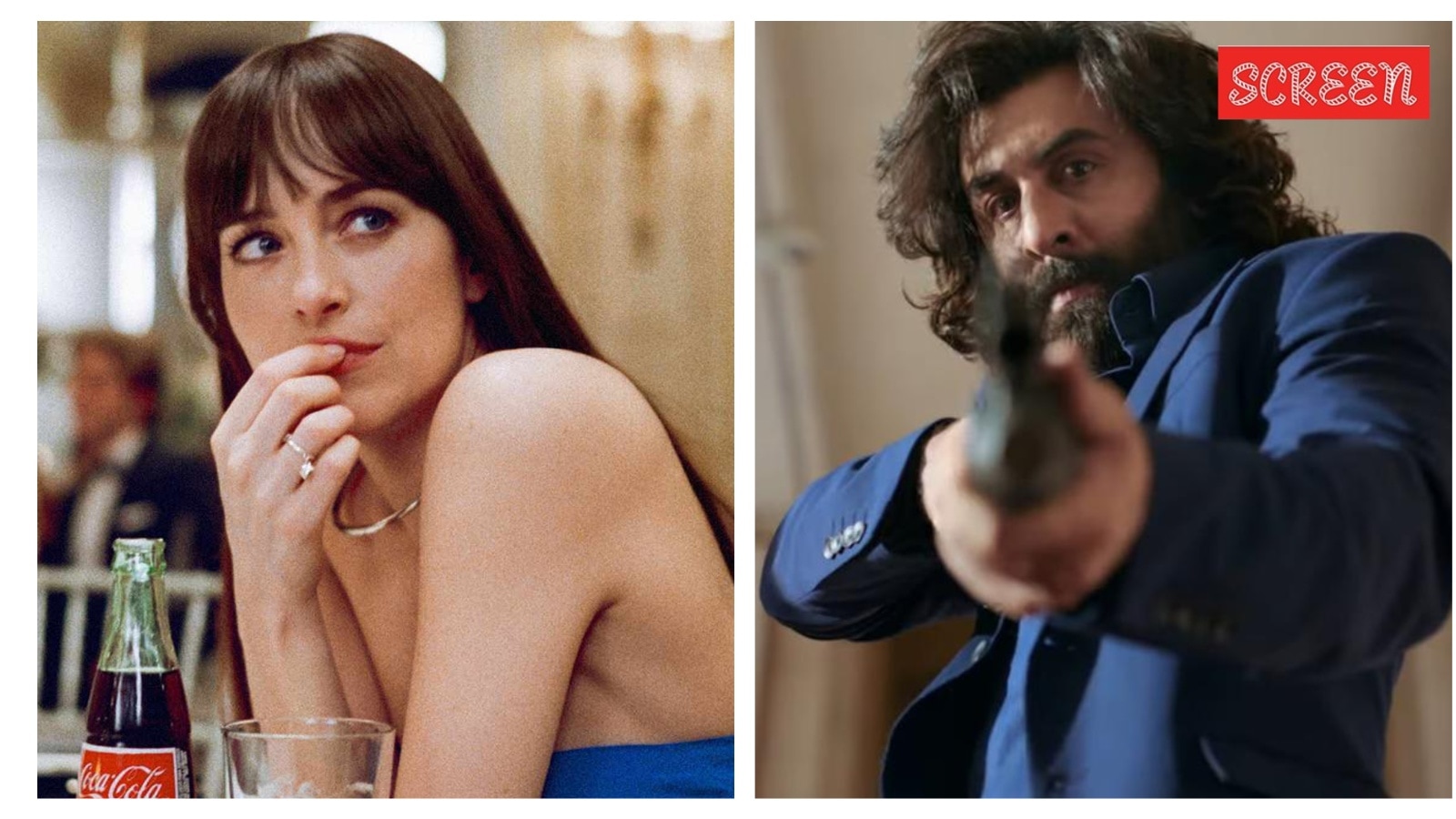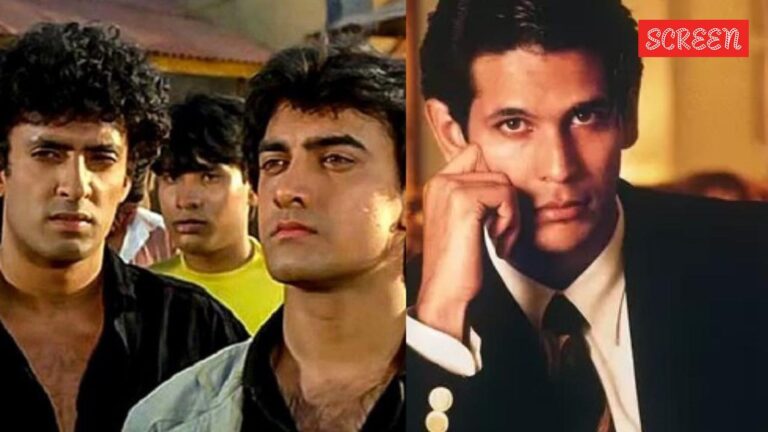Celine Song’s films, whether it’s Past Lives or Materialists, underline the dilemma of the modern woman — how much to love, how much to work, what to hold on to, what to let go of. They’re a woman’s attempts to elbow and make space for herself in a man’s world — without cutting any corners in the departments of both love and self-respect. Her new romantic movie begins in the prehistoric era where a caveman drags the raw carcass of his prey to his den, where the cavewoman waits. But their exchange isn’t limited to the carnal need of hunger: He also makes a ring out of flowers and makes her wear that as the title Materialists pop up across the screen.
At the outset, Song establishes that the film is about these materialists: a man who hunts and puts food on the table, and a woman who pines for the man only because she doesn’t want to sleep hungry. We then get transported to present-day New York City, where Lucy (Dakota Johnson) is working at a matchmaking agency, but is fixated on the match she wants for herself: a rich man who’ll pamper her with luxuries. Call her a gold-digger, a trophy wife, or any of those woke names: but at heart, as established, she’s merely a materialist.
Contrast that to Sandeep Reddy Vanga’s 2023 Hindi film Animal. Again, right at the outset, Vanga establishes Ranbir Kapoor’s character as an alpha male. Even before we name it, which is first heard right before the interval point, we know his personality type because he explains that in as many words. While wooing his love interest Geetanjali (Rashmika Mandanna), he argues that men were historically wired only as alphas. Only the weaker, insecure men, who couldn’t go out hunting, came up with poetry to give way to a new school of romantic inclination.
Instinctively drawn to that anthropological pitch, Geetanjali is won over by Rannvijay (yes, that’s his name, as we learn later). After all, he’s the titular Animal. And in this case, she’s Vanga’s definition of Materialist: a woman who pines for the alpha because evolution had no bearing on her. He shows the middle finger to Charles Darwin, reestablishes the rule of the jungle, and pulls the broken parts of the food chain back together while flexing his brawny biceps.

But unlike Lucy, Geetanjali doesn’t feature in this food chain at all. She just makes babies, witnesses her man’s downfall, nurses his wounds, poses as a punching bag, and eventually, gives up when her son follows in his father’s footsteps. Lucy in Materialists won’t fall for that cycle because instead of blindly surrendering to her impulses, she calculates. She calculates rather too much. For her, love is an elusive equation which is complex, but certain. It’s not abstract like art, but absolute like algebra. Her prospective match is the proverbial x in an equation, which she’s determined to solve, given all the surrounding variables.
Math leads her to Harry (Pedro Pascal), a billionaire, who just seems too good to be true. Is he really the sum of all the parts she checks off in her ideal prospect? Is he indeed the apex predator in a tuxedo? Hell, he doesn’t even go around shooting and slashing men, doesn’t bother to make his love interest lick his boots to prove her loyalty, and moreover, isn’t a prey to daddy issues. The materialist in Lucy is satiated. But how does the math make sense for Harry? “You can find someone younger,” she suggests, the matchmaker in her taking charge. Harry has the perfect solution: he wants her “intangible assets.” He’s easily the safest risk on paper.

But love doesn’t happen on paper. It’s carnal, primal, and elemental. Enter: John (Chris Evans), a struggling actor who has been at it ever since he was first in a relationship with Lucy. Like her, he calculates too: how many more dollars would it cost to park a car in X spot as compared to Y. But these are the very calculations Lucy wants to get rid of permanently. Instead of making a balance sheet for survival every month, she wants to employ all her arithmetic skills for once and then reap the returns of the financial division that’s a husband. She hates labelling John’s struggles “cheap” and “petty” because she was once there too, but she can’t keep hating herself for it. She wants to feel loved, the kind of love that comes as diamonds — stable, secure, and pretty.
Story continues below this ad
But John gets Lucy like Harry can never. He embraces her confusion by serving her go-to combination — coke and beer on demand, instead of refilling her wine glass. He sits down in the middle of work to be her bouncing board when she needs one, instead of buying her out of her stress. He sleeps on the footpath through the night while waiting for her as she tends to a work emergency, instead of employing his own resources to take care of that. And he sees them growing old together, instead of sponsoring cosmetic intervention to stall her youth. Not that Harry promises to do any of these, but the discovery of his surgically elongated legs makes Lucy realize that he’s too much of a calculated deal.
She gets aroused by her palatial apartment instead of his sexual advances. She smiles at his good ol’ chivalrous gestures, but is seduced only by the idea of that, and not really by the act itself. In Vanga-speak, Harry is the alpha every woman is seeking, and that too a rather well-behaved one. He has the money and the muscle, even if that’s more bank balance than brawn. But he’s too assured to be loved. Where is the uncertainty that comes with chasing dreams? The rebellious fulfillment that comes with a creative pursuit especially when it’s not financially rewarding? And the belonging of being holed up in a messy, shared apartment that feels like home? Both Lucy and John realize he’s a financially bad decision for her, but she can’t help but invest in him anyway.
Because it’s not that love shouldn’t be reduced to materialism, but that it can’t be. It’s not a case of earning woke points or being diplomatically tactful. By telling the story from the woman’s point of view, Materialists depicts the human instinct more accurately than Animal does. Both go back to caveman politics, but only Materialists acknowledges why man isn’t the only suffix that fits here. A cavewoman is indeed dependent on the caveman for sustenance, but as the film’s opening suggests, both realize there’s more to life than just preying and devouring. A woman may be historically designed to chase the riches, but she’s also inherently programmed to do better. That’s exactly what Vanga’s love letter to carnal origins misses out on: an Animal hunts, but he also evolves. If he puts food on the table, he also puts that ring on the finger. Diamonds or flowers don’t matter as much as the gesture. It doesn’t make him less of a man, but more of a human.

























